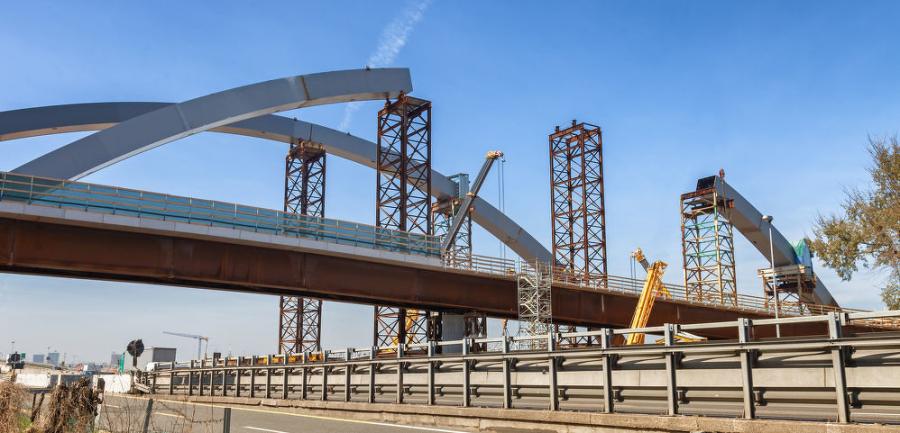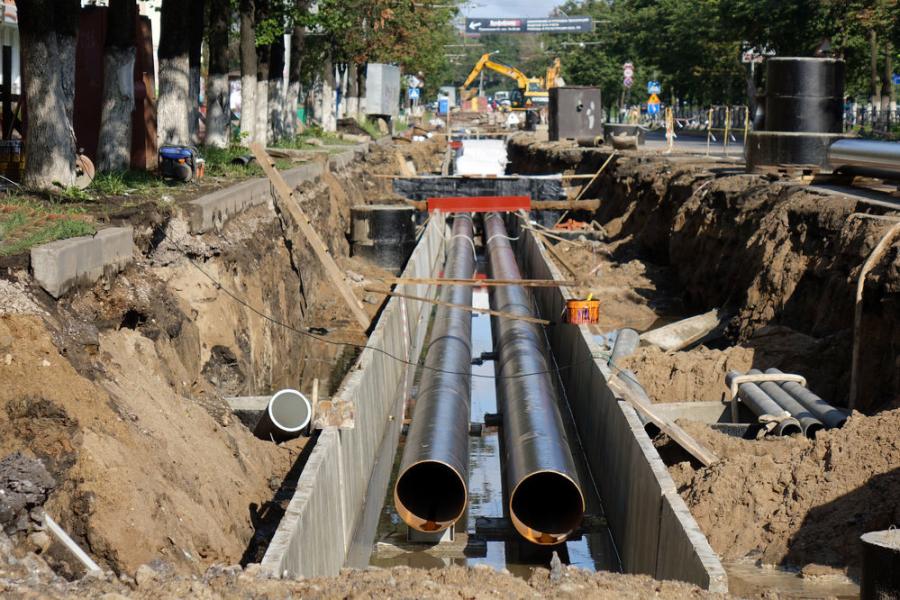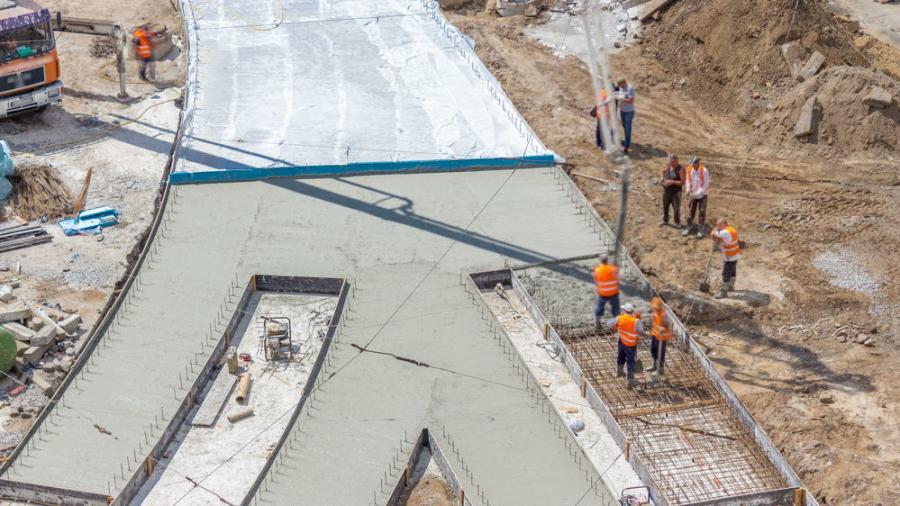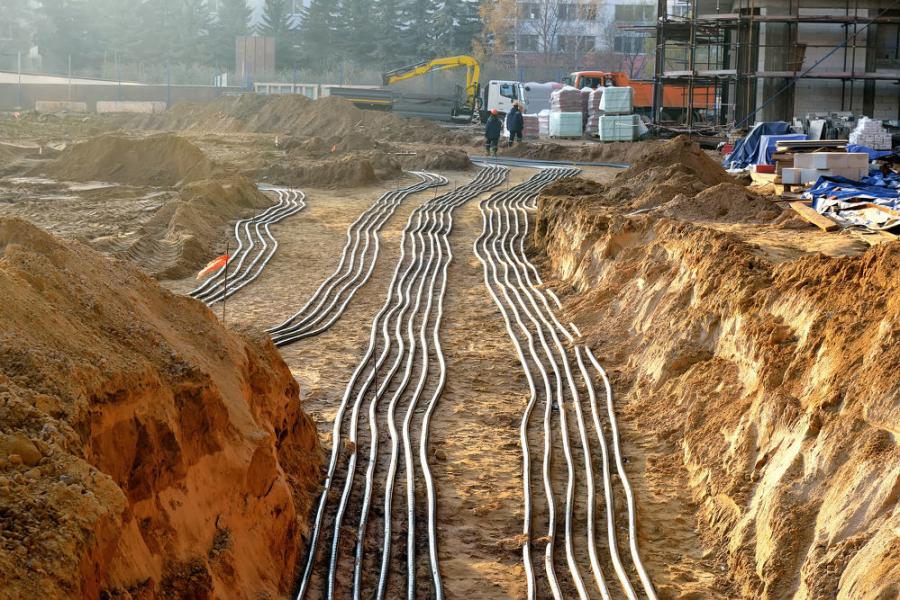The infrastructure package incorporates the Surface Transportation Reauthorization Act, a $311 billion bill that reauthorizes federal-aid road and bridge programs for five years.
U.S. construction stands to gain mightily now that President Joe Biden has signed the $1.2 trillion bipartisan Infrastructure Investment and Jobs Act into law. But the industry's collective sigh of relief may become nervous tapping as it prepares for work on much-needed infrastructure projects. The biggest threat to President Biden's vision of energizing the U.S. economy may be a dire shortage of everything from workers to cement mills.
"Republicans and Democrats are united in their support for hundreds of billions of dollars in new spending on infrastructure in coming years. Yet the companies that will be relied on to pave the roads, build the bridges, lay the water pipes and assemble the trains aren't yet planning to meet those needs," wrote Bloomberg News.
"And that's even as they face immediate shortages — from steel and cement to the supply of labor — stemming from the unprecedented difficulties of a sudden reopening of the economy after last year's shutdowns."
Many in the industry have faith in the process. The interesting thing about the construction workforce is that they're transient, maintains David Martin, president of the Arizona Chapter of the AGC.
"They go where there's opportunity. I have absolute confidence in the workforce system," Martin told KJZZ public radio in Phoenix, Ariz.
He's confident recent worries about labor shortages will have no impact on Arizona's ability to complete federally-funded projects. And President Biden will work with contractors to alleviate supply chain issues, he said.
Contractor John Walton told CNBC he believes the bill will not only bring a boom to the economy but much needed improvement to dilapidated structures nationwide.
Walton's Mobile, Ala., asphalt and highway construction company John G. Walton Construction plans to "cash in" on federal projects once funds travel down to state governments.
There's a lag, of course, between when a bill is signed into law and when federal dollars are allocated — and when local businesses like Walton's can bid on these projects.
With some 20 percent of the bill, or $110 billion, dedicated for the construction of roads and bridges, he told CNBC, he's hoping for a long-term boom in business.
"If states have the money come in, they can plan those projects out," Walton said. "Sometimes it takes two or three years from design to actual construction, so that really helps contractors because they know what's coming down the pipe."
What Is Coming
The bipartisan infrastructure bill contains $550 billion in new spending. "The $1.2 trillion figure comes from funding normally allocated each year for highways and other infrastructure projects," John Probasco wrote for Investopedia.
The AGC breaks the funding down, noting the package incorporates the AGC-endorsed, Senate Environment and Public Works Committee passed Surface Transportation Reauthorization Act.
A $311 billion bill, it reauthorizes federal-aid road and bridge programs for five years. "This bill represents a 30 percent increase in road funding over current levels," noted AGC.
The package also includes:
- an additional $110 billion of new spending on top of reauthorization for highways, roads and bridges, including $55.48 billion in additional contract authority and $55.52 billion in additional funding for a host of programs, such as the Bridge Investment Program, USDOT RAISE and INFRA grants, and Private Activity Bonds.
- an extension of currently authorized federal transit policy and funding levels.
- an additional $39.15 billion for transit programs on top of the extension; $19.15 billion in additional contract authority; $4.75 billion of additional funding for State of Good Repair Grants; $8 billion of additional funding for Capital Investment Grants; and $7.25 billion for other programs.
- the Surface Transportation Investment Act, a $78 billion reauthorization of federal freight and passenger rail programs.
- an additional $66 billion in new spending on top of the reauthorization, including $6 billion for Northeast Corridor grants; $36 billion for Federal-State Partnership Intercity Passenger Rail; $16 billion for Amtrak; $5 billion for Consolidated Rail Infrastructure and Safety Improvement program; and $53 billion in other related spending
Other Relevant Funding:
- Ports and Waterways: $17.3 billion
- Airports: $25 billion in new spending for airport infrastructure, including $20 billion for runway, taxiway and terminal projects; and $5 billion for air traffic control infrastructure.
The $550 billion in new spending is paid for through a host of sources, according to AGC, including repurposed COVID-relief funding, refunded and fraudulently paid unemployment benefits and other extended or reinstated governmental fees.
Good News for Construction
Stephen Sandherr, CEO of the AGC, said the new infrastructure measure provides much-needed new federal investments in a wide range of infrastructure projects.
"These investments will help generate new demand for construction services, equipment and materials," he believes.
"More important, the new investments will create high-paying construction career opportunities and help make our economy more efficient and competitive."
ARTBA President and CEO Dave Bauer also heralded the infrastructure bill as a testimony to the strong bipartisan spirit demonstrated in the Senate, which he believes sets the bar high.
"The U.S. economy and transportation system users stand to benefit most from enactment of an infrastructure bill that combines historic investment levels with pragmatic policy reforms," said Bauer.
He added a caution, though, saying the vote is "a much-needed step but not the finish line."
Bauer said ARTBA will "continue to work with the House, Senate and the Biden administration to help achieve an outcome that addresses America's transportation infrastructure needs today and in the future."
Associated Builders and Contractors echoes much of the construction industry's positive comments.
Michael Bellaman, ABC president and CEO, said the infrastructure package contains the most significant investment in the nation's infrastructure in a generation.
It "could yield crucial wins for the American people and construction industry," said Bellaman, adding that it is promising to see progress made toward transportation modernization.
"This bipartisan accomplishment is something that has eluded Congress for decades and is proof of the possibilities when lawmakers choose compromise over conflict."
He believes "commonsense" provisions in the bill will cut down on unnecessary delays in federal construction projects and help address the workforce shortage in the construction industry.
"Importantly, the bill is paid for without raising job-killing taxes on our nation's small construction businesses."
ABC has concerns about the bill's expansion of prevailing wage and support for misleading ‘buy American' and ‘local hire' requirements, which could impact the ultimate success of the legislation, said Bellaman.
Every sector mentioned in the bill's breakdown has "a significant boots-on-the-ground need" for construction in order to facilitate projects, believes Ben Johnson, chief operating officer of construction lending firm Kapitus.
"One thought is the infrastructure bill encourages the procurement of supplies that will go into projects through domestic sources, domestic manufacturing and materials," he explained.
"While not all this work will be shovel-ready for the next year or two, the procurement of materials will start sooner than that."
That procurement head start, coupled with the repatriation of manufacturing to U.S. soil, will be a boost to the construction industry overall in a shorter timeframe that the launch of construction projects themselves, continued, Johnson.
"We would encourage contractors to make sure they are approved to participate in government contracts and look into ways they can participate from an eligibility approval standpoint."
Contractors should also "think deeply" about where the money is going and whether there is a business opportunity for expansion in their anticipation of work.
"I don't mean they need to go hire people today — let's not get too far ahead — but to start thinking where the market is likely to go," said Johnson.
"With the dollars earmarked, contractors will want to do research now to be ready to participate when the money comes down."
Just How Dire Are the Straits?
There's already a labor shortage in construction, so "you can't throw a trillion-dollar nuclear bomb of money into the industry," said Bassem Hamdy, CEO of Briq, a company that runs cost estimates for construction firms. "If you don't have workers, how will this ever happen?"
Construction firms are excited for more business but aren't yet taking steps to boost hiring or move workers, Hamdy told Bloomberg.
U.S. steelmakers aren't boosting supply enough to meet expected demand. And tariffs on items including aluminum and lumber are hampering affordability.
President Biden has said his administration will combat supply pressures, starting with the construction materials and transportation bottlenecks.
But, "for all the ‘Made in America' push by both Biden and his predecessor, Donald Trump, American manufacturers are confronted with a legacy of historically mediocre growth over the past decade, and a future colored by lackluster U.S. demographic trends," wrote Bloomberg.
These factors alone discourage companies from ramping up capacity, even amid dizzying prices, the news service noted.
"Certainly contractors are dealing with tremendous opportunity on the one hand and operational difficulties on the other," said Johnson of Kapitus.
"Disruption in the supply chain as a result of Covid and the procurement of goods from overseas as well as domestic production backed up quite significantly."
The huge hurdle top of mind for contractors is labor shortages, and the scarcity of quality skilled labor, he continued.
In the light of a continued strong housing market coupled with the additional funds the infrastructure bill lays out, some problems are likely to be exacerbated for the construction industry, he said.
"The ability to hire skilled employees, is a huge issue. Given the current dynamics, I wouldn't be surprised to see wage inflation as a result," speculated Johnson.
"Hopefully as the economy continues to repair itself, we'll see an increase in the overall labor pool. Some people who have chosen not to participate may come back into the market and be able to take those critical jobs."
Tom Conway, president of United Steelworkers, the largest industrial union in North America, told Bloomberg he's concerned that the supply crunch means the industry — and contractors — will have to source materials abroad, benefiting other countries with employment gains, instead of the United States.
"Here's what I think the administration has to be concerned about," Conway said. "All these manufacturers will say, ‘We're not ready. We need more runway to get ready. So in the meantime, get it offshore and do the projects and we'll get started on ours.' "
The housing industry now is worried about the competition from infrastructure projects. The National Association of Home Builders said the U.S. will need to lift tariffs on lumber and import more key metals to ensure there's enough aluminum for appliances, copper for wiring and cement for foundations.
Domestic U.S. saw mills haven't kept up with construction, and the housing industry imports about 30 percent of its lumber from Canada, reports Bloomberg. Lumber prices are up an estimated 400 percent since the start of the 2020 recession.
The infrastructure bill "will place a huge demand for steel and concrete that will impede our ability to build out multifamily and other types of housing," said Jerry Howard, CEO of NAHB.
"You've got to increase output. And where that's going to come from? Lord only knows. It'll be difficult to enact because of the lack of supplies, labor, everything."
The infrastructure bill increases the demand for trained workers, which the United States doesn't have enough of. The manufacturing industry remains down more than 500,000 positions from February 2020. Immigration could help, but that's politically challenging, maintains Bloomberg.
"By the time we get to infrastructure hitting the ground, there will be a labor shortage and to some extent the government is going to have to compete with private businesses for people," said Aneta Markowska, chief U.S. economist at Jefferies.
Delays in passing the infrastructure bill may end up being beneficial, Michael Gapen, chief U.S. economist at Barclays Plc, told Bloomberg. Constraints on supply chains could ease over time, he said.
On the flip side, Johnson of Kapitus points out that of all the verticals his firm finances, construction has bounced back from an application standpoint faster than any other.
"There is tremendous demand in the housing market and growth in home sales amid a scarcity of real estate. The fact that so many people have been working from home and reconsidering how they want to live their lives and what kind of home they want is leading to considerable demand for construction."
In fact, Johnson is glad to see the infrastructure bill specifically target domestic manufacturing and procurement. He believes that should drive additional manufacturing growth here and demand for domestic construction business.
All of that, he said, is quite positive for the firm's client base. "We believe it's positive for the overall economy as well," he added.
Lucy Perry
Lucy Perry has 30 years of experience covering the U.S. construction industry. She has served as Editor of paving and lifting magazines, and has created content for many national and international construction trade publications. A native of Baton Rouge, Louisiana, she has a Journalism degree from Louisiana State University, and is an avid fan of all LSU sports. She resides in Kansas City, Missouri, with her husband, who has turned her into a major fan of the NFL Kansas City Chiefs. When she's not chasing after Lucy, their dachshund, Lucy likes to create mixed-media art.
Read more from Lucy Perry here.
Today's top stories


















